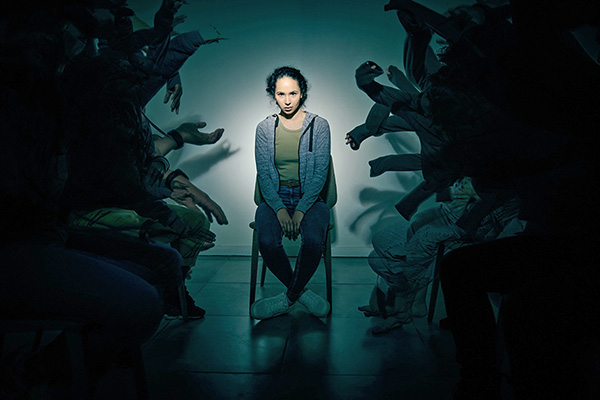dysfunctional behavior
Ghosting, Gaslighting And Gameplaying!
 In my work as a psychic, I assist clients daily with navigating life’s challenges, especially their relationships with the people in their life. While the guidance I receive from spirit has essentially remained the same over the years, the language I use to relay this information changes over time.
In my work as a psychic, I assist clients daily with navigating life’s challenges, especially their relationships with the people in their life. While the guidance I receive from spirit has essentially remained the same over the years, the language I use to relay this information changes over time.
The professional psychic must constantly adapt and renovate the terminology she uses in readings to communicate spirit’s messages. New slang and buzzwords continually show up in our culture as society evolves, and it must become part of the psychic’s vocabulary to ensure she communicates clearly and effectively.
Three of the new terms that frequently comes up in readings these days is ghosting, gaslighting, and gameplaying.
Ghosting
Ghosting is when someone stops communicating with you, casually ignores you, and no longer replies to any of your calls or messages. All communication is abandoned for no apparent reason.
“He has been ghosting me!” some clients frequently exclaim. “What is going on? Why is he acting this way?” In these readings, it often becomes clear that he may be doing so for one of the following reasons:
Painting As A Powerful Spiritual Practice
 As a visual artist, I find painting to be a powerful tool for spiritual growth and manifestation. Art has been used as a medium for self-expression and energy channeling for centuries. Painting in particular is an enlightening way to tap into one’s innermost thoughts and feelings and connect with your higher self.
As a visual artist, I find painting to be a powerful tool for spiritual growth and manifestation. Art has been used as a medium for self-expression and energy channeling for centuries. Painting in particular is an enlightening way to tap into one’s innermost thoughts and feelings and connect with your higher self.
One of the ways that painting can be particularly helpful in growth and healing is that it offers a way for us to let go of what no longer serves us. We too often hold onto old traumas, fears, and limiting beliefs that keep us stuck in negative patterns. Channeling these toxic thought patterns and emotions into art can help us to release it and create space for new energy to flow in.
The act of painting itself can be deeply meditative and calming, allowing the artist to quiet the mind and tap into their intuition. When we allow ourselves to be mindful and entirely present in the moment and focus solely on the act of creating, we access a state of energetic flow that is incredibly soothing, healing, and transformative.
Additionally, painting can be used as a powerful tool for manifesting. When we create art with a specific intention in mind, we are essentially using our thoughts and imagination to give physical form to that intention. Making an original painting is much more powerful and intentional than creating a vision board, for example. By painting images and scenes of the things we desire, we are sending a clear message into the universe that we are ready to receive it.
Old Baggage Is Not A Badge of Honor
 I have successfully worked with many clients over the years who finally found me after they chose to hang onto anger, resentment, bitterness, or self-pity for many years, even decades, to their own detriment. Withe guidance of spirit, I have also helped many people find peace and healing, after they had pushed away everyone in their life away by continuously abusing the patience, compassion and generous support of their friends and family, by burdening them with same, sad story or repetitive dysfunctional behaviors, over and over again.
I have successfully worked with many clients over the years who finally found me after they chose to hang onto anger, resentment, bitterness, or self-pity for many years, even decades, to their own detriment. Withe guidance of spirit, I have also helped many people find peace and healing, after they had pushed away everyone in their life away by continuously abusing the patience, compassion and generous support of their friends and family, by burdening them with same, sad story or repetitive dysfunctional behaviors, over and over again.
I have also witnessed the amazing personal growth and miraculous healing of those who were able to let go of the anger and hurts. And I have watched many thrive once they realize that their self-worth and personal power begin outside the comfort zone of their long-standing victim mentality.
I asked spirit for a message today to share with those that are stuck in this way and not moving forward in life. This is what I was given.
Do not dwell upon your pain, do not try to make yourself a martyr in suffering. Stop allowing the things that have hurt you to control where you are in the here and now.
It is time to boldly step up, stand your ground, and say, “I love myself and I am not going to let the past control my life any longer. I am stronger than all that has happened to me. And yes, it hurt me in the moment, but I refuse to drag it with me any longer further, because it prevents me from moving in the direction of my highest good. It poisons my well-being and steals my happiness, and I refuse to allow it any longer.”
Choose Your Words Wisely
 Did you ever stop to think about the sounds that come out of our mouths? We use them to form phrases and sentences. It is how we communicate. But, have you ever considered the true nature of these sounds, or the power contained within our words, the power of the vibration?
Did you ever stop to think about the sounds that come out of our mouths? We use them to form phrases and sentences. It is how we communicate. But, have you ever considered the true nature of these sounds, or the power contained within our words, the power of the vibration?
Words are formed using the organs of speech that creates a vibration, thus causing a sound. We know that sound doesn’t just disappear. Sound travels – from our mouths, past the person it is directed to, past a few others, and on and on, into the ethers.
Words are more powerful than we realize. Maybe we should choose our words more wisely. If we send negative words out, whether we sincerely mean it or not, it never goes away. That negative vibration we sent out has an effect on the earth, the solar system and the universe. It may even come back and have an effect on you, without you ever even realizing it.
Historically soldiers have always marched as an army in one way or the other. It made me wonder why they march in sync and to a set rhythm, like they do. Because, it looks cool? No, they march in unison and uniformly, because their foot stomping causes a vibration. If the vibration matches the frequency of a target, it becomes a powerful weapon.
The Walls of Jericho is a good example. The Israelites wandered the desert for 40 years. Upon arriving at Jericho, they marched around the city for six days. On the seventh day they circled the city seven times. The priests then blew their trumpets and they shouted and the walls of the city fell down. Just another bible story? Well, we know vibration can bring down bridges and maybe those priests knew the note to play that gave a specific vibration that brought those walls down.
The Life-Long Journey Of Self-Love
 Self-love is essential for mental, physical, and emotional well-being. It is vital to have a positive, loving attitude towards yourself and take care of your own needs. Not only is this essential for living a happy and healthy life, but it also empowers you to be more loving and caring towards others.
Self-love is essential for mental, physical, and emotional well-being. It is vital to have a positive, loving attitude towards yourself and take care of your own needs. Not only is this essential for living a happy and healthy life, but it also empowers you to be more loving and caring towards others.
Self-love is often misunderstood. Many people think that self-love is only about pampering oneself, indulging in extravagance, or buying yourself expensive things. It is much more than that. It is not about being selfish, self-indulgent, or narcissistic. Instead, it is about accepting yourself, taking care of yourself and understanding your true worth.
Truly loving yourself is therefore about knowing your worth, appreciating your unique strengths and abilities, and treating yourself with compassion and kindness. It is also about taking personal responsibility for your life, making choices and decisions that serve your highest good, and letting go of negative thoughts and self-destructive behaviors.
It is also important to realize that self-love is a journey, not a destination. It is a life-long process that is part of our soul purpose in this lifetime. It is a state of being that requires patience, dedication, commitment and effort.
Cultivating self-love begins with understanding yourself, accepting your flaws, and learning to forgive yourself. It involves setting boundaries and taking responsibility for your own needs and happiness. It is also about cultivating positive relationships and learning to trust yourself.
Facing Our Inner Demons
 I am in the process of relocating, again. Yes, I have done this many times before. I have repeatedly packed up my most treasured belongings to completely reboot my life in a different town, city, or state.
I am in the process of relocating, again. Yes, I have done this many times before. I have repeatedly packed up my most treasured belongings to completely reboot my life in a different town, city, or state.
Some people find moving to be a logistical hassle and inconvenience, while others find it very challenging to say goodbye to friendly faces and familiar places. They therefore avoid it whenever possible. But for me relocating to a new place is an inspiring opportunity and invigorating adventure! Settling in a new place, to explore and discover, have novel experiences, and create new memories, is so very exciting. It keeps me young and motivated!
It is however important to note that I do not choose to relocate because I am running away from myself, my problems, or life’s challenges. It is true that some people relocate frequently because they hope it may solve their problems or help them to somehow feel happier. This is never a good idea.
The problem with moving for the wrong reasons is that you pack up and take all your troubles with you. At first, things are interesting and fun in the new location, but within a few months the ‘runners’ find themselves exactly where they were before. The problems they faced before, tend to be the same problems they now have in the new place. Right back to square one.
This kind of repeating pattern is something I often find with clients I do readings for. Someone I supported during a relationship break-up might call me one day, excited to tell me about their ‘perfect’ new love interest. Things are very exciting for a while for the new couple, until the same old patterns of dysfunctional behavior, conflict or drama begin to surface.
How To Deal With Toxic People
 Toxic people can be incredibly difficult to deal with in both personal and professional relationships and can be detrimental to your personal happiness and well-being.
Toxic people can be incredibly difficult to deal with in both personal and professional relationships and can be detrimental to your personal happiness and well-being.
A toxic person is someone whose constant negativity and dysfunctional behavior causes drama in your life and drains you energy whenever they are around. Typical toxic traits include negativity, cynicism, apathy, lack of self-awareness, arrogance, entitlement, self-centeredness, domineering behavior, lack of empathy, being judgmental, dishonesty, anger outbursts, to name only a few.
The most extreme forms of toxicity includes personality disorders like antisocial, borderline, histrionic, and narcissistic personality disorder. A personality disorder is a rigid, deeply characteristic way of thinking, feeling and acting that severely affects the person’s mental well-being, personal relationships and social life.
Toxic people can however be tricky to identify at first, as their dysfunctional traits and behaviors can be very subtle. Some of them are also very good at ‘gaslighting,’ which makes interacting with them even more treacherous.
Gaslighting is a very toxic form of manipulation, game playing, or crazymaking in which you are constantly being misled, confused, lied to, and made to question your own truth and reality. You increasingly feel unsure about the accuracy of your own memories regarding certain events and your personal opinions and perceptions of the world. You may even begin to think that you are to blame for the toxic person’s actions, or that maybe something is very wrong with you, or worse, that you are losing your mind.